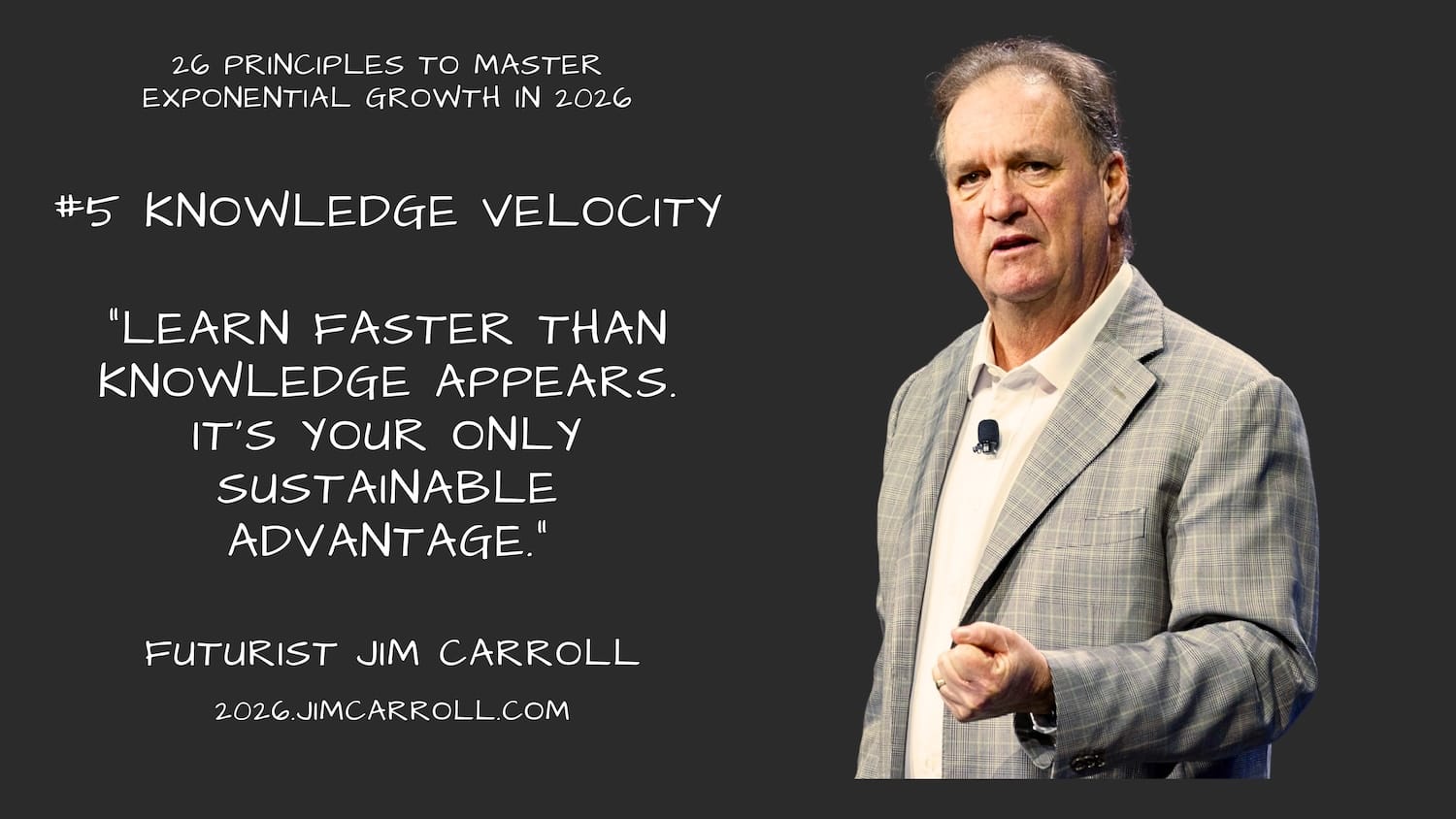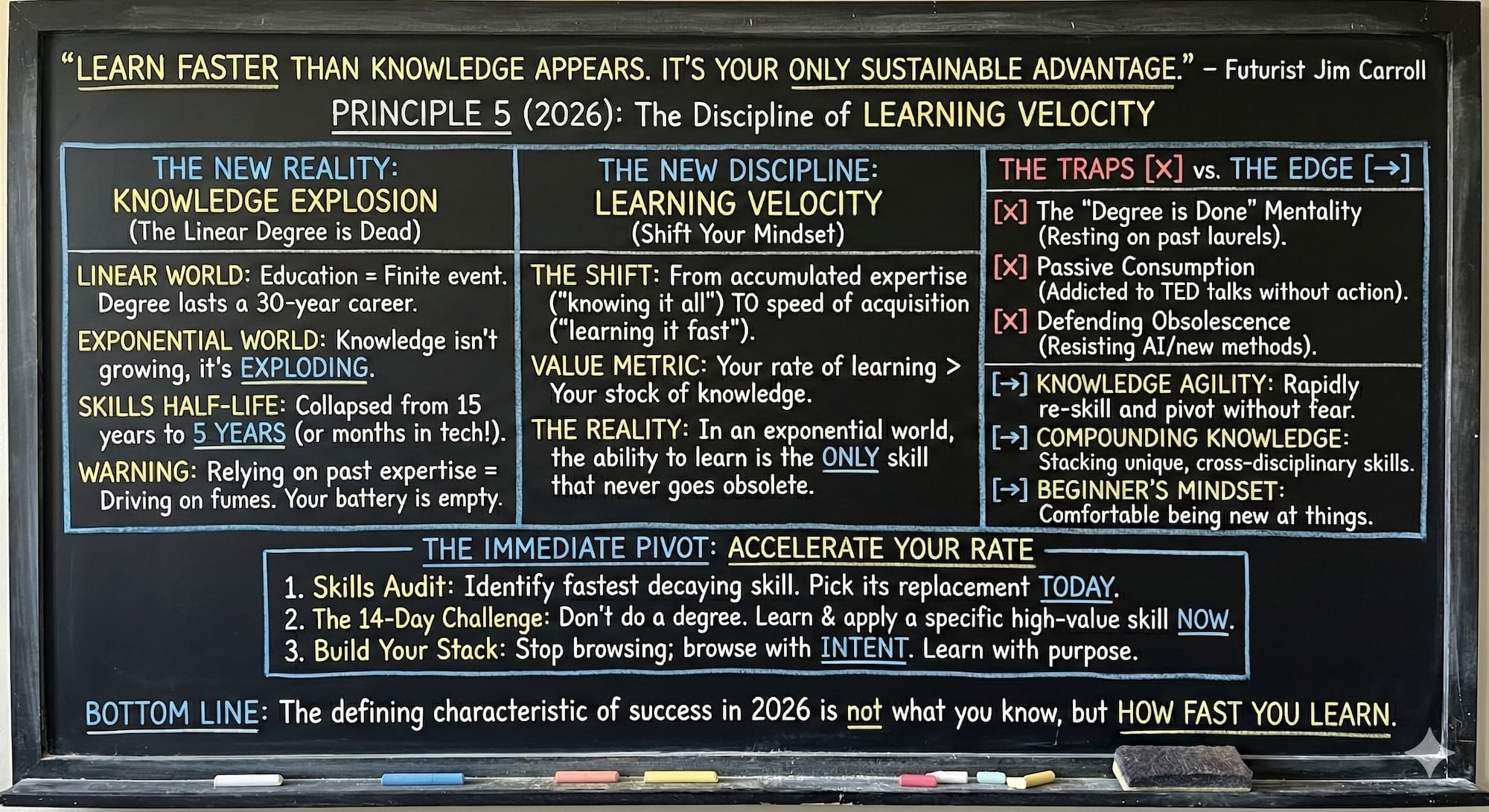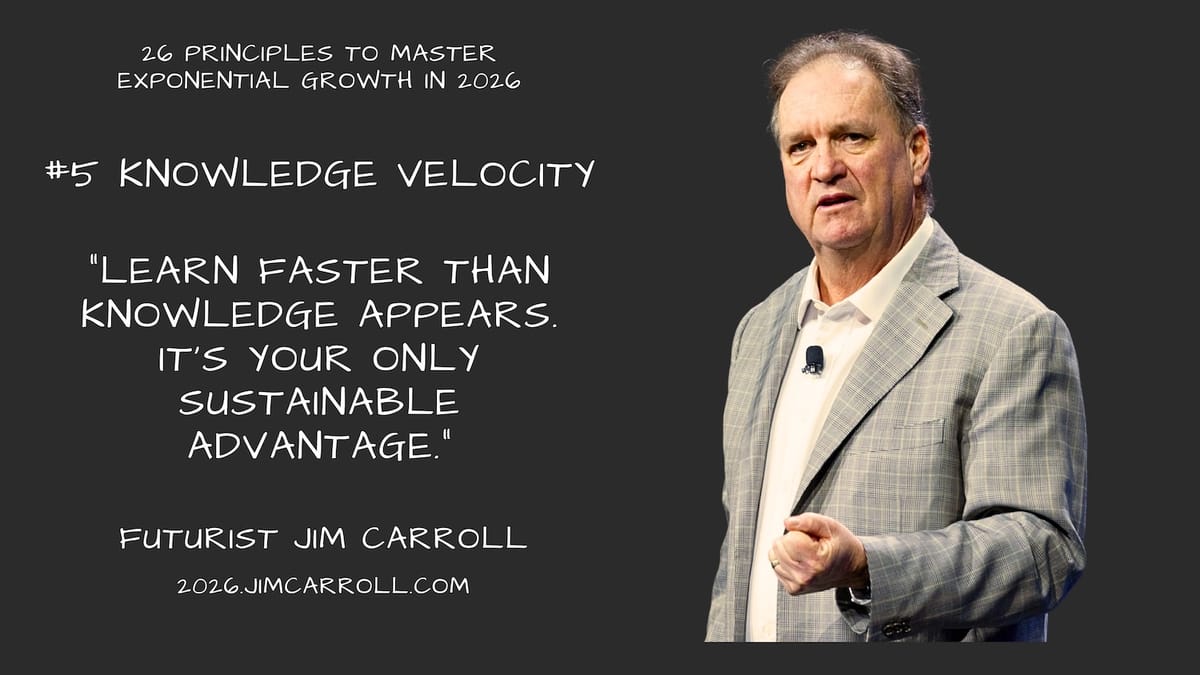"Learn faster than knowledge appears. It’s your only sustainable advantage." - Futurist Jim Carroll

Futurist Jim Carroll is writing his end-of-2025 / introduction-to-2026 series, 26 Principles for 2026. You can follow along at 2026.jimcarroll.com. He welcomes your comments.
We are three days into resetting your mindset for 2026.
Day 5? It's all about learning velocity, and the fact that you need to stop relying on your degree and start learning for your life!
Here's your chalkboard summary!

I want you to implant this idea firmly in your mind right now: skills decay. Add to that concept the idea of the half-life of knowledge. Layer on top of it my often-repeated phrase - the ability to master just-in-time knowledge is key.
The former is happening faster because the latter is becoming smaller. Once you understand that, you need much of what you need to know for 2026 - your ability to align and realign to the new velocity of knowledge will be key to everything you do.
Think about the change we are in the midst of. In a linear world, your education was a finite event. You went to college, got a degree, learned a trade, or got a set of professional skills, and that block of knowledge was something you could rely upon for a 30-year career with only minor maintenance.
But in an exponential world, knowledge is not just growing; it’s exploding. I've written about this a lot, but it bears repeating. I often share on stage the fact that the average half-life of a professional skill has collapsed from 10-15 years to just 5 years today. Or the fact that it is said that half of what you know today will be obsolete in five years, if not sooner. In some high-tech fields, that timeline is compressed even further, with knowledge potentially doubling in a matter of months or even hours.
This means that if you are relying on what you already know, i.e, with your past degree, your decade of experience, to carry you through 2026, you are driving on fumes. Your battery is empty, your mind is out of gas, and you'll soon hit the limit of where you can go.
Bottom line? The knowledge that got you here is decaying faster than you can replace it with linear learning methods.
In that context, the defining characteristic of a successful professional in 2026 will not be their stock of knowledge, but their rate of learning.
Principle 6? The discipline you must master is Learning Velocity.
1. The Exponential Mindset
Learning Velocity? It's a shift from viewing education as something you did in the past to something you do all the time.
It has you measuring your professional value not by your accumulated expertise ("knowing it all"), but by the speed at which you can acquire, integrate, and apply entirely new skills ("learning it fast"). It’s the recognition that in an exponential world, the ability to learn is the only skill that never goes obsolete.
2. The Linear Trap
Ask yourself if you are stuck in these common learning traps. They are the anchors keeping your skill set linear while the market demands exponential capability!
- You've got a "degree is done" mentality: You tend to treat your formal education (college degree, certification) as something that gives you everything you need, rather than the foundational layer of a lifelong building project. You believe your past hard work exempts you from future hard learning. That type of thinking just won't cut it anymore.
- You rely on just-in-case learning: You spend way too much of your time learning things "just in case" you might need them someday, rather than focusing on Just-in-time knowledge - learning how to rapidly acquire new skills to solve an immediate problem.
- You try to get by with 'passive consumption' masquerading as learning: You're addicted to TED talks, leadership videos, motivational gurus, new podcasts, or scrolling LinkedIn, without actually trying to think about what you are trying to accomplish. Heck, do you read my stuff but never really act on it? True learning requires active practice, application, and the discomfort of being a beginner.
- You rely too much on your past expertise: You resist most new methods or technologies because they threaten your established identity as an expert. You're totally negative on AI because you are overwhelmed by what is going on, on you're angry that it is sending some of your skills into the trash can.
With all of this, you need to ask a key question: Are you too busy defending your obsolescence rather than accelerating your reinvention?
3. The Exponential Edge
To get beyond all this, you need to move into the idea of exponential learning - and a world in which you are changing your relationship with the speed of knowledge change. These are the key things you are doing:
- You develop a new 'knowledge agility': You no longer fear technological disruption because you know you have the capacity to rapidly re-skill and pivot into new roles. Your career becomes flexible, evolving, and accelerating.
- You've learned how to 'compound your knowledge': By continuously stacking new skills on top of each other, you are learning h0w create unique, cross-disciplinary combinations (e.g., a marketer who learns Python, a lawyer who understands AI prompt engineering) that are highly valuable and difficult to automate.
- You are ok with always being new at things: You become comfortable with the discomfort of being a beginner.This allows you to enter emerging fields early, where there are no experts yet, giving you a massive head start over those waiting for the 'definitive textbook' to be written.
Exponential knowledge? It has you involved in a new way of thinking, a new way of learning, and a new way of developing your skills.
4. The Immediate Pivot
So how do you do this?
You cannot accelerate your learning without changing your daily habits. Think about a few of these ideas:
- Conduct a 'skills half-life" audit: list your top five professional skills. Honestly estimate how long until each is largely automated or obsolete, particularly in the context of what is happening with AI. Identify the one that is decaying fastest and pick its replacement skill today. Commit to trying to figure out that thing!
- Just start learning new stuff: don't sign up for a two-year degree. Find a specific, high-value skill (e.g., basic data visualisation, advanced AI prompting) and commit to learning enough to apply it within the next 14 days.
- Build your 'personal learning stack': put together a tight list of things you will use to learn faster. Pick specific YouTube channels, online course sources, and AI activities. Start to use these things to figure things out faster. Stop simply browsing - browse with intent!
A few years ago, your reality was that 'what you know right now won't get you through the next decade.' Now, in the context of accelerating AI and other trends, what you know right now might not get you through the next few years.
One of the most important pivots you need to make in 2026 is to pick up the pace, with our ability to learn new knowledge, master new skills, and learn new stuff.
Get going!
Futurist Jim Carroll spends a LOT of time learning new stuff, knowing that this is the key to everything!

